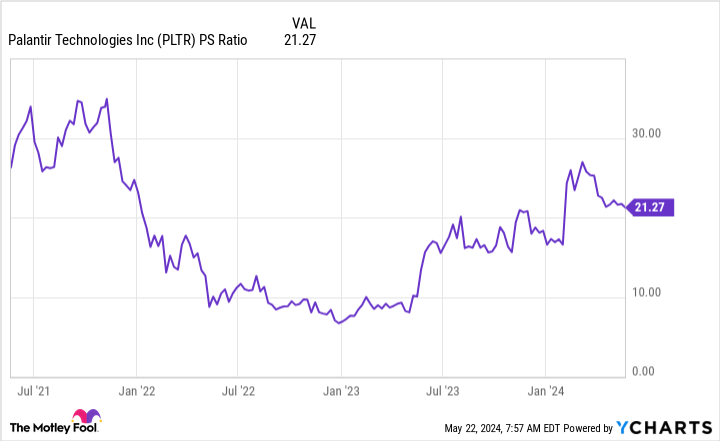Palantir is now the fund’s second-largest holding.
Tracking what hedge funds are doing can be an excellent check when determining your investment strategy. If you see a couple of hedge funds loading up on a stock you own, you’re probably on the right track. However, using this information at face value can also be an issue, as there are multiple reasons why a hedge fund might be buying a stock.
Renaissance Technologies, which delivered 62% annualized returns before fees and 37% after fees from 1988 to 2021 in its Medallion Fund, significantly increased its position in Palantir Technologies (PLTR -0.52%). In fact, Palantir saw the largest size increase of all the fund’s positions, and now makes up 1.71% of the fund’s assets — the second-largest position.
So should you follow suit and load up on Palantir? Or is there something else going on here?
Palantir’s latest product has become a hit
Palantir has become a popular artificial intelligence (AI) stock pick, as it has been developing AI tools for much longer than many of its competitors. For a long time, Palantir developed AI tools for various government branches that essentially took in loads of data and then delivered actionable insights to its users.
When most people discuss AI right now, they’re referring to large language models (LLMs), which are the driving force behind generative AI technology. While these models are incredibly useful, integrating them into business systems with proprietary information can be challenging. That’s where Palantir’s latest project, the artificial intelligence platform (AIP), comes in.
AIP allows companies to integrate AI throughout all aspects of their business, and can be used to automate functions. It can also simulate scenarios to understand what may happen in a business. The use cases for AIP are endless, which has got investors all worked up.
The word Palantir’s management continues to use in conference calls when describing AIP demand is “unprecedented.” This plays out in Palantir’s financial results, particularly in U.S. commercial revenue, which rose 40% year over year and 14% quarter over quarter in Q1. As customers in this segment see success, AIP will eventually find its way to Palantir’s largest customer: governments.
Understandably, many governments are hesitant to fully integrate AI solutions because they haven’t vetted whether the technology is safe enough. With many pop culture movies centered around AI going rogue and causing damage, there isn’t always a positive outlook associated with AI. However, these are science fiction ideas for a reason, and AIP will likely be integrated in the future.
This would be a huge boost for Palantir, as government clients made up 53% of total revenue in Q1.
That’s a legitimate upside for the stock, but is that why Renaissance Technologies bought it?
The stock is far too expensive for fundamental investors
As mentioned above, you must investigate why a hedge fund buys a stock before blindly following it. This is the case with Renaissance Technologies’ purchases of Palantir’s stock.
Renaissance Technologies describes itself as “an investment management firm that employs mathematical and statistical methods in the design and execution of its investment programs.” So this hedge fund doesn’t really care about a business’s fundamentals, only the mathematical models behind trading patterns and stock charts.
As a result, this hedge fund’s activities are more noise than signal, but that shouldn’t stop you from buying Palantir’s stock if you believe it’s set up to succeed.
However, the rest of the market also thinks Palantir is primed for success, so the stock trades at a hefty price-to-sales (P/S) ratio.
PLTR PS Ratio data by YCharts
There are many expectations already baked into Palantir’s stock, so the business may succeed, but the stock may not go anywhere. As a result, I think there are far better stocks to invest in than Palantir, as the company’s growth rate doesn’t support its valuation.
Keithen Drury has no position in any of the stocks mentioned. The Motley Fool has positions in and recommends Palantir Technologies. The Motley Fool has a disclosure policy.


